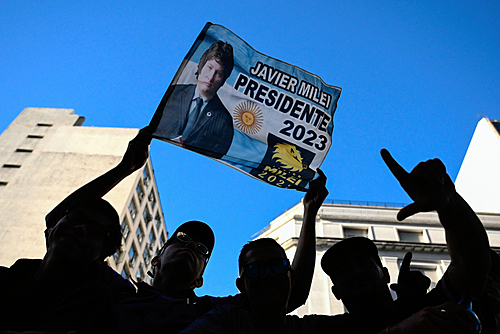
The elected president of Argentina, Javier Milei, will face enormous difficulties in governing the country. And, taking the country’s recent history as a starting point, there is a considerable chance that he will not be successful and will not even be able to complete the term that begins on December 10th. This is the opinion of Carlos Vidigal, history professor at UnB and scholar of Argentina, in an interview with Brazil in fact after the announcement of the electoral results.
The new president’s difficulties, according to him, will be concentrated in four aspects: social programs, salaries, inflation and external debt. As for the first two items, Vidigal sees a similar logic: the government needs to try to restore the values deteriorated due to inflation, which in the current economic moment, will be “extremely difficult”, as well as the creation of jobs, “which is something that at the moment it’s not even on the horizon.”
In turn, the reasons for these difficulties on a social level are mainly inflation and external debt. “To face inflation, a competent economic team is not enough. A political agreement similar to what occurred in other countries is necessary, for example, in the case of Brazil, during the time of Fernando Henrique Cardoso, a great political agreement with the business sectors”.
In relation to the debt, says Vidigal, the government “may even find it easier to talk to the International Monetary Fund and the government in Washington, but there is a very big political cost which would be its extreme right-wing speech, since the (Joe) Biden is the president of the USA and Milei’s speech is very similar to Donald Trump’s. So, perhaps this is the biggest international challenge that has very serious domestic political repercussions.”
The UnB professor thinks that, if the perspective for the Milei government is analyzed in light of recent history, there will probably be failure in building a parliamentary majority. “Liberals have shown enormous difficulty in building basic consensus and I believe that the Macri government (2015-2019) is an excellent example of the failure of liberals in government. The Peronist opposition could lead to strikes and demonstrations and, if there is a long delay in combating inflation, we will probably have an early weakening of the government, which is why I have doubts about the completion of the mandate”.
After the shock of the crushing defeat, Argentines will know how to join forces for resistance, says the president of PSOL / Juan Mabromata/AFP
Unity against the far right
O Brazil in fact also heard from Juliano Medeiros, national president of PSOL, about the reasons that led to Massa’s defeat and what to expect from the progressive resistance from now on.
“Argentina has a tradition of very intense political struggle and mobilization. I imagine that democratic, popular forces will sit at the table to organize resistance because they are aware, especially based on the experiences of Brazil and the United States, of what an extreme right-wing government means. So, I am confident that there will be a unity effort.”
Medeiros thinks that it was a mistake on the part of the Peronist coalition, União pela Pátria, to run a more central, moderate campaign, based on the political calculation that, since it already has the votes of left-wing voters, it is necessary to win over those on the left. center. “This shows a misunderstanding of what political processes in Latin America have become. They are being marked by polarization and those who do not polarize, those who do not go forward, those who do not clearly show their ideas, end up having more difficulty gaining the trust of voters. Just look at President Lula’s campaign in 2022, which was much more combative than his previous campaigns. It was an option that is now taking a toll, along with the economic and political crisis, and leading Argentina to this disaster.”
The PSOL president says that what caught his attention was the fact that, in meetings with members of Massa’s campaign, they showed interest in the 2022 Brazilian presidential campaign, and not in the 2018 campaign, when the left lost and Jair Bolsonaro took the lead. far right to power.
“Few people looked at our 2018 campaign, which was a defeat. But Argentina is more similar to the Brazil of 2018, immersed in a political, economic and social crisis, than to the Brazil of 2022. I’m not here to judge the mistakes and successes, but it seems to me that there was a difficulty in understanding the that was happening.”
Editing: Rodrigo Durão Coelho

Source: www.brasildefato.com.br

